David Doepel and his wife Barbara Connell are successful serial entrepreneurs. In 2021, instead of retiring, they became co-custodians of the historic Melville Park farm in Brunswick, Western Australia, 90 minutes’ drive south of Perth.
Here, they have embraced the local community and are collaborating on a variety of projects to add value to premium primary produce, including heirloom fruit and veg, milk from a local dairy (for cheese production) and ‘fermentables’ (for their artisanal distillery and cidery).
David is also actively collaborating in R&D with Murdoch University and Future Food Systems to develop new tools and products – from better bioinoculants and waste-to-fermented-plant-food solutions to low-carbon footprint wastewater processing; methods for attracting beneficial insects; AI-enabled, non-invasive ripening sensors; and autonomous drone applications.

The market garden at Melville Park farm, growing summer crops – heirloom varieties of zucchini, eggplant, tomato and capsicum – in January 2022. Credit: Melville Park
Planting a market garden with a difference
For the past three-and-a-half years, David and Barbara have been hard at work understanding the farm’s soil, installing an irrigation system, and planting heirloom vegetables, fruit and herbs including a heritage apple orchard (Normandy cider varieties) and an oak and pine trufflery.
“After a century’s absence, we have re-established a market garden on the property prioritising heirloom fruits and vegetables and utilising agro-ecological farming principles. We have also built a raised-bed herb garden and asparagus garden,” says David. “Currently growing like the clappers are at least 20 heirloom varieties of tomatoes, chillies, capsicum, heirloom pumpkins, eggplants, cucumbers, zucchinis, summer squash, corn, beans, okra and melons, for starters.”
Taste is important – hence the heirloom tomatoes. “We also pick ripe for immediate consumption,” David says.
Where possible, David and Barbara plant less common (hence higher value) varieties selected for their superior flavour and eating qualities.
Barbara has also pursued her passion for flowers, and they too are now finding their way into the market garden repertoire.

David Doepel shows a tour group around the market garden at Melville Park. Credit: Future Food Systems
Ensuring sustainable production
At Melville Park, growing methods are eco-friendly and sustainable, David assures: “We use below-ground drip irrigation, with water sourced from the Brunswick River and a certified compostable “plastic” mulch (Mater-Bi). We are a light touch concerning sprays and only use remedies in the organic arsenal. We do not use glyphosate for horticultural weed control or synthetic insecticides or fungicides.
“Our focus is on feeding the soil, encouraging good biology which in turn feeds the plants. We encourage the presence of raptors for natural control of vermin and beneficial insects for control of non-beneficial insects.”
Turning local milk into artisanal cheeses
One of the first things David and Barbara did at Melville Park was retrofit the disused dairy, turning it into a gleaming artisanal cheese factory complete with traditional ageing/ripening caves. Here, they create delectable artisanal cheeses, including a traditional French-styled Camembert, a Gouda, a Cheddar, and one or two seasonal cheeses. They sole-source milk from the Halls Family Dairy, whose cows are also agisted at Melville Park.
“Our philosophy focuses on making hand-crafted cheeses that express unique and memorable flavours derived from the local grass-fed, super-fresh evening milk, as well as cheeses that benefit from patient ageing in les caves d’affinage,” Barbara explains.

Dairy cows agisted at Melville Park provide the milk for a range of artisanal cheeses Barbara makes in the converted dairy. Credit: Melville Park
Establishing a small-batch distillery
The farm’s Jarrah-block-floored, high-raftered heritage brick barn will become the barrel-ageing room for Melville Park’s soon-to-be-established small-batch distillery, which will produce Calvados-style apple brandy from locally grown apples; whiskey; and a traditional vodka from David and Barbara’s farm-grown sugar beets and potatoes.
“Farmers for millennia have managed the abundance of harvest by fermenting excess production,” David notes. “Whether a grain, a fruit or vegetable, the starch or sugars present can be transformed and preserved.
“Melville Park continues this tradition by grounding its choice of spirits in the available produce from its seasonal abundance and nearby farms. And we embrace – as we are doing with our cheesemaking – the methode traditionale of distillation.”

View of the historic barn from the back gate of the farmhouse. Credit: Melville Park
Farming fungi
David’s father was a mycologist of some standing in Western Australia who focused on major disease threats; in particular, Jarrah Dieback and Apple Scab. David continues the tradition – focusing, however, on edible fungi. Along with growing culinary fungi, David and Barbara plan to plant “lots of symbiotic ectomycorrhizal fungi on the property, in association with conifers – think porcini, as well as truffles”, David says.
Reaping the returns
Already, Melville Park has begun supplying seasonable fresh produce including heirloom tomatoes, corn and culinary herbs, as well as handmade cheeses, to local hospitality outlets. One keen customer is gastro-pub Brugan Brewery. Another example of smart value-adding, Brugan is owned by a husband-wife team originally from Melbourne, who also run the onsite brewery.
Melville Park also sells direct from the farm-gate store in the historic barn, open on Saturdays and by appointment.

FFS-supported PhD student Henry Obiazikwor from Murdoch University talks about his research trials at Melville Park farm. Credit: Future Food Systems
Collaborating in research and development
David and Barbara are big believers in innovation, and in the key role R&D plays in creating smarter, more sustainable, more profitable agrifood systems. To this end, Melville Park is working with researchers from Murdoch University – including a trio of FFS-backed PhD students – as part of the FFS-backed ‘Novel crop microbiome technology’ project. The students are growing experimental plots of vegetables here as part of their work investigating the root, shoot and leaf microbiomes of three popular horticulture crops: avocado, potato and tomato.
And Melville Park is already collaborating on future R&D, David says.
“In a separate proposed study, we will use the by-products from the cheese factory as a semi-fermented liquid fertiliser used via fertigation dosing,” he says. “And we are working on a novel (and non-chemical) way of controlling powdery mildew along with an aspiration for advanced non-invasive sensing for ripeness enabled by AI.”
Reducing food waste by value-adding
Beyond the obvious plus of bringing in more income, David and Barbara are “really keen to shift the dial on food waste,” David says. “In the first instance, we reject the phrase. Why is slightly blemished food classified as waste? Why is ripe unsold food ‘wasted’ by including it in a circular farm economy and feeding animals?
“We are advocating for a more holistic approach to managing abundance on farms. By capturing value through transformation of ingredients, we increase the resilience and profitability of our enterprise.
“We also love the creativity that goes with it. And by extension, drawing in many local community members with incredible skills and family traditions, who are also now becoming part of transforming what we grow into better food.
“However, we must mention the challenges around the pursuit of value-addition. One set of challenges is the upskilling we have needed to produce food safely at commercials-scale. Secondly, the compliance required by various government regulations.
“Significant work is required, in our opinion, to make the pathway for success clearer and easier for on-farm value addition.”

L-R Dr Lijun Summerhayes, Luke McQuillan, Dr James Krahe and Prof. Brian Sindel tour Melville Park’s market garden. as part of the 2024 For Food’s Sake Summit in Western Australia. Credit Future Food Systems
Harnessing the power of collaboration
That pathway is made easier by joining forces with others who have the knowledge and skills to help deliver viable solutions.
“Collaboration, again, contributes to resilience,” contends David. “We are learning, at a rapid rate, from people who are multi-generational local farmers, who understand the soil, the weather and the seasons. They also know how to fix things and do things more simply and often less expensively.
“We are not afraid to ask for help, and we learned very early on to confess ignorance straight away – ‘I have no idea what you are talking about’… ‘So how do you do that?’… ‘Can I please buy some of your time and wisdom?’.”
Barbara and David’s ultimate goal here at Melville Park goes beyond value-adding – and it’s a far cry from the conversation western concept of retirement.
As David says, “We’re swapping retirement for ‘joie de vivre’ – which. according to the Oxford Dictionary, is ‘the exuberant enjoyment of life’.”
More information
For further information about what’s happening at Melville Park, or to contact David and Barbara, visit their website.
Lead image: David Deopel and wife Barbara Connell. co-custodians of historic mixed-farming operation Melville Park, 90 minutes drive south of Perth, Western Australia. Image courtesy of David Doepel


